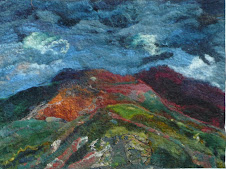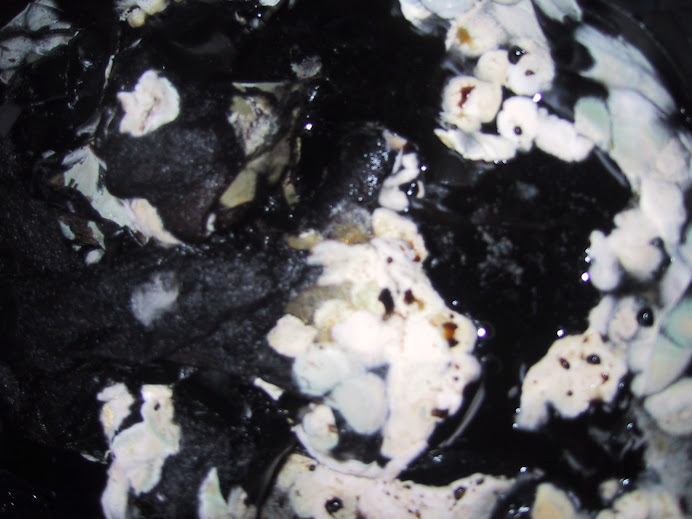Quite where time goes too I don't know but although I am not blogging much I am dyeing.! :)
 Here is the colour I got from the weld ( Reseda Luteola) I found growing by the Conwy Estuary a few weeks ago,. I roughly chopped the weld and put it into a kilner jar with 50 gms of blufaced leicester and then left it for a few days. When I had time Iput it into large pan with two other ecopots so the pots were in a waterbath andheated slowly for a few hours. The colour from the weld was not brilliant-quite pale but I was too busy to deal with it so I left it for a few days before popping it back in the pan for another slow heating . This time the yellow deepened and a tad of ammonia turned it the bright yellow in the picture. I haven't taken it out as I am demonstrating eco dyeing at Trefriw Textile Market on Sunday 4th December and this is a good example of how you can test dyes without having to use lots of heat. The other advantage of this method is multicoloured dyeing and when I have a moment I shall show the results of dyeing with several dyes. Or you could come ( if you can) to the Textile Market to the Demos on the morning if the second day!
Here is the colour I got from the weld ( Reseda Luteola) I found growing by the Conwy Estuary a few weeks ago,. I roughly chopped the weld and put it into a kilner jar with 50 gms of blufaced leicester and then left it for a few days. When I had time Iput it into large pan with two other ecopots so the pots were in a waterbath andheated slowly for a few hours. The colour from the weld was not brilliant-quite pale but I was too busy to deal with it so I left it for a few days before popping it back in the pan for another slow heating . This time the yellow deepened and a tad of ammonia turned it the bright yellow in the picture. I haven't taken it out as I am demonstrating eco dyeing at Trefriw Textile Market on Sunday 4th December and this is a good example of how you can test dyes without having to use lots of heat. The other advantage of this method is multicoloured dyeing and when I have a moment I shall show the results of dyeing with several dyes. Or you could come ( if you can) to the Textile Market to the Demos on the morning if the second day!
 Waterbath dyeing is decribed in my book Colours of the Wolrd Ecodyeing which you can buy from my website.
Waterbath dyeing is decribed in my book Colours of the Wolrd Ecodyeing which you can buy from my website.
If you would like to know mor eabout the book Jenny Dean generously reviewed it on her blog and you can find that here
 Here is the colour I got from the weld ( Reseda Luteola) I found growing by the Conwy Estuary a few weeks ago,. I roughly chopped the weld and put it into a kilner jar with 50 gms of blufaced leicester and then left it for a few days. When I had time Iput it into large pan with two other ecopots so the pots were in a waterbath andheated slowly for a few hours. The colour from the weld was not brilliant-quite pale but I was too busy to deal with it so I left it for a few days before popping it back in the pan for another slow heating . This time the yellow deepened and a tad of ammonia turned it the bright yellow in the picture. I haven't taken it out as I am demonstrating eco dyeing at Trefriw Textile Market on Sunday 4th December and this is a good example of how you can test dyes without having to use lots of heat. The other advantage of this method is multicoloured dyeing and when I have a moment I shall show the results of dyeing with several dyes. Or you could come ( if you can) to the Textile Market to the Demos on the morning if the second day!
Here is the colour I got from the weld ( Reseda Luteola) I found growing by the Conwy Estuary a few weeks ago,. I roughly chopped the weld and put it into a kilner jar with 50 gms of blufaced leicester and then left it for a few days. When I had time Iput it into large pan with two other ecopots so the pots were in a waterbath andheated slowly for a few hours. The colour from the weld was not brilliant-quite pale but I was too busy to deal with it so I left it for a few days before popping it back in the pan for another slow heating . This time the yellow deepened and a tad of ammonia turned it the bright yellow in the picture. I haven't taken it out as I am demonstrating eco dyeing at Trefriw Textile Market on Sunday 4th December and this is a good example of how you can test dyes without having to use lots of heat. The other advantage of this method is multicoloured dyeing and when I have a moment I shall show the results of dyeing with several dyes. Or you could come ( if you can) to the Textile Market to the Demos on the morning if the second day!  Waterbath dyeing is decribed in my book Colours of the Wolrd Ecodyeing which you can buy from my website.
Waterbath dyeing is decribed in my book Colours of the Wolrd Ecodyeing which you can buy from my website. If you would like to know mor eabout the book Jenny Dean generously reviewed it on her blog and you can find that here



























I love your books, and now I am going to peruse them one more time, seems everytime I look at them I learn something new...
ReplyDeleteThanks Cedar I am really glad that they are useful. :)
ReplyDeleteWhat a brilliant way to get several things in a dye pot! When the snow is gone from here (Calgary), i'll have to give it a shot!
ReplyDelete